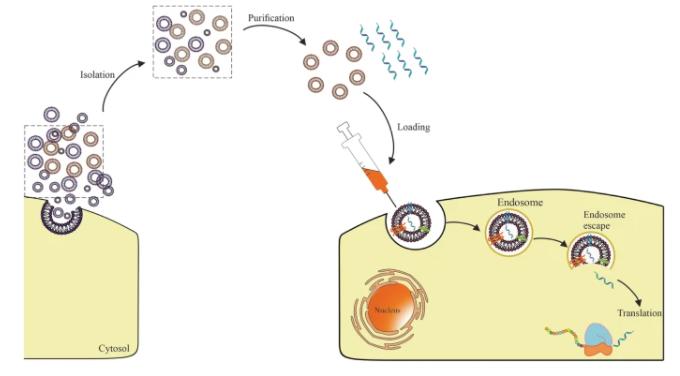Exosomes for mRNA Delivery
Online InquiryExosomes have emerged as promising carriers for mRNA delivery. Exosomes are natural transporters and therefore less toxic or immunoreactive. Moreover, their stability in the blood, their ability to cross biological barriers such as the blood-brain barrier (BBB), and their inherent targeting properties, make exosomes an ideal system for nucleic acid drug delivery. To promote the application of exosomes as carriers for therapeutical mRNA delivery, Creative Proteomics is committed to offering a series of exosome-related services, including exosome isolation, identification, labeling, manufacturing, and so on. With years of experience in exosome technology, we are confident to provide high-quality exosomes for global clients.
 Fig. 1 mRNA-encapsulated exosomes. (Aslan, Cynthia, et al., 2021)
Fig. 1 mRNA-encapsulated exosomes. (Aslan, Cynthia, et al., 2021)
mRNA delivery system development
In vitro transcribed (IVT) mRNAs have recently shown great potential as a new drug class to deliver genetic information. Synthetically modified mRNAs provide the basics for a broad range of potential applications, including infectious disease vaccines for current and future pandemics, cancer immunotherapies, and the manufacturing of monoclonal antibodies. However, mRNA-based therapies face a variety of obstacles, including the large size of mRNA, inherent instability and high sensitivity to enzymatic degradation. In order to address the challenges of mRNA-based therapy, delivery systems are urgently needed for efficient mRNA delivery.
Continuous work is still necessary for further improvement of delivery systems to facilitate the wider application of mRNA-based therapy. To develop delivery systems that show a promising mRNA delivery profile, there are several key criteria that should be obeyed, including,
- Reduce nonspecific uptake
- Enhance tissue permeation
- Targeted intracellular delivery
- Controlled release kinetics
Support of exosomes as mRNA carriers
To use exosomes as a mRNA delivery system, sufficient quantities of exosomes must first be available. Moreover, exosomes must be pure enough to be free from cellular and molecular contamination. In order to describe the function of exosomes, it is necessary to carefully character their composition and carriers. Here, we are offering a series of exosome-related services for mRNA delivery, including,
| Exosome analysis services | |
|---|---|
| Exosome isolation and purification | Sucrose gradient centrifugation |
| Polymer-based exosome enrichment method | |
| Immunomagnetic bead method | |
| Size exclusion chromatography method | |
| Exosome identification | Nanoparticle tracking analysis (NTA) |
| Electron microscopy analysis | |
| Western blot | |
| Exosome marker assay | Isolation and enrichment of exosomal CD9, CD63, CD81, TSG101, HSP70 proteins |
| Exosome surface protein identification and quantitative analysis | |
| Exosome engineering | Exosome labeling and tracking |
| Cargo loading | |
| Engineered exosome production | |
| Cargo loading assessment | |
| Exosomes labeling and tracking | Exosome fluorescent labeling |
| Fluorescence exosome purification | |
| Fluorescent exosome concentration labeling | |
| Exosome multiomics analysis | Exosome proteomics analysis: Exosome protein profile identification Exosome protein composition analysis Exosome protein expression level analysis Exosome protein differential expression analysis |
| Exosome metabolomics analysis: Exosome differential metabolite screening Qualitative and quantitative analysis of target metabolites/metabolic pathways | |
| Exosome lipidomics analysis: Exosome lipid composition and level analysis Differential expression analysis of exosomal lipid molecules Qualitative and quantitative analysis of targeted lipid molecules | |
| Exosomal biogenesis and identification | Our capabilities will provide strong support for the study of exosome biogenesis and its identification. |
| Exosomal cargo and loading mechanism | Our services can greatly help the study of exosomal cargo and loading mechanism, facilitating the diagnostic and therapeutic applications of exosomes. |
| Exosome function research | In vitro analysis of the function of exosomes In vivo analysis of the function of exosomes |
Why choose us
- Rich exosome research and analysis experience
- Professional platforms with state-of-the-art technologies and equipment
- Custom services according to our customers' samples and requirements
- The best after-sales service
The recent advance in exosome technologies has greatly promoted the use of exosome-based mRNA delivery systems in the treatment of various diseases, such as breast cancers, Parkinson's disease, glioma, and leukemia. In addition to scalable upstream isolation, purification, and production of exosomes, we offer downstream processing for efficient exosome characterization and labeling to obtain high-quality, functional exosomes that can be used for mRNA delivery. If you are interested in our services, please don't hesitate to contact us. We will spare no effort to answer them for you.
References
- Aslan, Cynthia, et al. "Exosomes for mRNA delivery: A novel biotherapeutic strategy with hurdles and hope." BMC biotechnology 21.1 (2021): 1-12.
- Tsai, Shang Jui, et al. "Exosome-mediated mRNA Delivery in vivo is safe and can be used to induce SARS-CoV-2 immunity." Journal of Biological Chemistry 297.5 (2021).
* For Research Use Only. Not for use in diagnostic procedures.



